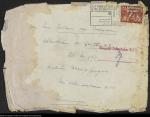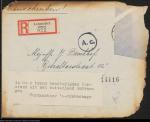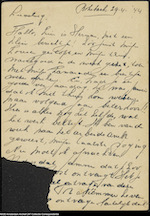
Hidden treasure and papers strewn with cigar ash: on the archival documents that find their way to NIOD
The institute has been receiving donations of all shapes and sizes since 1945. Organisations and people give individual documents and objects, but they also donate whole archives and (private) collections. The donations have often been kept in a dilapidated or fragmented state. Some archives were (partly) lost in bombing raids or split up after the liberation, to be re-used in post-war legal redress, for example, or in the search for missing persons.

Sometimes it’s a miracle that the documents withstood the ravages of time and ended up in the NIOD collection at all – not least when you consider that some of the diaries were written on scraps of paper and smuggled out of camps, bit by bit. Or take the diary in a jerrycan that survived the atomic bombing of Nagasaki, or the letters on board a sunken ship that spent one-and-a-half years at the bottom of the Ijsselmeer. I’ve often marvelled at the cards, postcards and letters that were thrown from deportation trains; mostly because of the horrific conditions in which they were written, of course, but also because the letters – some of them not even stamped – were picked up along the railway line and still found their way to the addressees.


Does it spark joy?
NIOD’s donation records are also full of stories of neglect and over-enthusiastic clear-outs. In 1946, for example, an acquisitions employee cursed the ‘wads of paper strewn with cigar ash’ that ‘nevertheless had to be picked through, piece by piece.’ In addition, one regularly (including as recently as the last decade) comes across accounts in the records of donors finding (archival) documents in the trash. I can’t bear to think about how many historical documents failed to survive the most recent Marie Kondo craze. Then again, tidying up does not always mean throwing things away. On the positive side, archival documents may resurface as a result – sometimes after many years – whereupon they can be brought safely to an archive institution, either directly or first making a detour via heirs, or flea markets and book fairs. Incidentally, do you intend to sell or dispose of old books? Check the cover first! In the donation records, I often read about archival documents being found in books, mostly bibles.
Hidden treasure
Archive material also seems to resurface when people move house or do renovations (might the diary of Anne Frank’s sister, Margot, one day be found in this way?). The relatively late emergence of archive documents is sometimes related to the fact that certain information was deliberately hidden during the war. For example, we know of stories of how people who feared conviction not only deliberately destroyed documents, but also purposefully concealed them, as the liberation approached. There’s an account in our donation records, for instance, of how the donor’s son-in-law discovered a package under a wooden floor while renovating, containing ‘two NSB membership booklets (with stamps until 1 July 1944!), a sizeable collection of pins and medals (...) and all kinds of official NSB correspondence.’ The finding place alone indicates that the documents did not end up there ‘by chance.’
Personal archives
It’s easy for archives to get lost, especially when they contain documents created by individuals, families, associations, businesses, churches and so forth. Unlike public bodies, they don’t fall under the Public Records Act, which means they are not subject to any transfer obligation. As a result, these documents rarely end up in an air-conditioned archive depot, or they are brought in too late. This is disastrous for special war heritage, not least when you consider that paper from the war period is often of volatile quality; the commonly used wood fibres acidify more rapidly than the rag-based paper that was standard beforehand. In addition, the usual hotspots such as attics, lofts or basements rarely provide a suitable storage climate. There is often little ventilation, and temperatures and humidity levels can run high, causing damp and mildew (see Figure 4).

Donating to NIOD
NIOD’s donation records clearly highlight the vulnerability of historical documents, both during the war and in the years since. As part of the upcoming spring clean, I would like to ask everyone to keep an eye out for any valuable pieces. If you would like to make a donation, or you’re unsure whether something might be ‘archive-worthy’, please contact an archive institution. When it comes to war documents, NIOD is the place. Our experts ensure that your donation is preserved in the right climatic conditions. What’s more, the archives are made accessible and can be consulted in the reading room for (scientific) research. On this page, you can find out more about donating material to NIOD. If you have any letters, postcards, photographs, drawings or other archival material that you would like to leave to NIOD in your will, please fill in a museum codicil.
